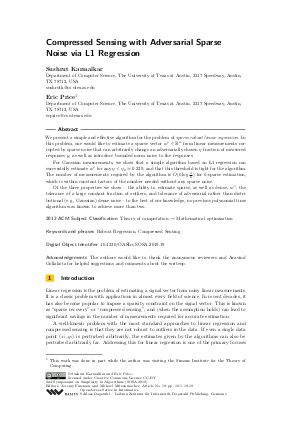Compressed Sensing with Adversarial Sparse Noise via L1 Regression
Authors Sushrut Karmalkar, Eric Price
-
Part of:
Volume:
2nd Symposium on Simplicity in Algorithms (SOSA 2019)
Part of: Series: Open Access Series in Informatics (OASIcs) - License:
 Creative Commons Attribution 3.0 Unported license
Creative Commons Attribution 3.0 Unported license
- Publication Date: 2019-01-08
File

PDF
OASIcs.SOSA.2019.19.pdf
- Filesize: 0.5 MB
- 19 pages
Document Identifiers
Subject Classification
Keywords
- Robust Regression
- Compressed Sensing
Metrics
- Access Statistics
-
Total Accesses (updated on a weekly basis)
0Document
0Metadata
Abstract
We present a simple and effective algorithm for the problem of sparse robust linear regression. In this problem, one would like to estimate a sparse vector w^* in R^n from linear measurements corrupted by sparse noise that can arbitrarily change an adversarially chosen eta fraction of measured responses y, as well as introduce bounded norm noise to the responses. For Gaussian measurements, we show that a simple algorithm based on L1 regression can successfully estimate w^* for any eta < eta_0 ~~ 0.239, and that this threshold is tight for the algorithm. The number of measurements required by the algorithm is O(k log n/k) for k-sparse estimation, which is within constant factors of the number needed without any sparse noise. Of the three properties we show - the ability to estimate sparse, as well as dense, w^*; the tolerance of a large constant fraction of outliers; and tolerance of adversarial rather than distributional (e.g., Gaussian) dense noise - to the best of our knowledge, no previous polynomial time algorithm was known to achieve more than two.
Cite As Get BibTex
Sushrut Karmalkar and Eric Price. Compressed Sensing with Adversarial Sparse Noise via L1 Regression. In 2nd Symposium on Simplicity in Algorithms (SOSA 2019). Open Access Series in Informatics (OASIcs), Volume 69, pp. 19:1-19:19, Schloss Dagstuhl – Leibniz-Zentrum für Informatik (2019)
https://doi.org/10.4230/OASIcs.SOSA.2019.19
BibTex
@InProceedings{karmalkar_et_al:OASIcs.SOSA.2019.19,
author = {Karmalkar, Sushrut and Price, Eric},
title = {{Compressed Sensing with Adversarial Sparse Noise via L1 Regression}},
booktitle = {2nd Symposium on Simplicity in Algorithms (SOSA 2019)},
pages = {19:1--19:19},
series = {Open Access Series in Informatics (OASIcs)},
ISBN = {978-3-95977-099-6},
ISSN = {2190-6807},
year = {2019},
volume = {69},
editor = {Fineman, Jeremy T. and Mitzenmacher, Michael},
publisher = {Schloss Dagstuhl -- Leibniz-Zentrum f{\"u}r Informatik},
address = {Dagstuhl, Germany},
URL = {https://drops.dagstuhl.de/entities/document/10.4230/OASIcs.SOSA.2019.19},
URN = {urn:nbn:de:0030-drops-100455},
doi = {10.4230/OASIcs.SOSA.2019.19},
annote = {Keywords: Robust Regression, Compressed Sensing}
}
Author Details
References
- Kush Bhatia, Prateek Jain, Parameswaran Kamalaruban, and Purushottam Kar. Consistent Robust Regression. In I. Guyon, U. V. Luxburg, S. Bengio, H. Wallach, R. Fergus, S. Vishwanathan, and R. Garnett, editors, Advances in Neural Information Processing Systems 30, pages 2110-2119. Curran Associates, Inc., 2017. URL: http://papers.nips.cc/paper/6806-consistent-robust-regression.pdf.
-
Kush Bhatia, Prateek Jain, and Purushottam Kar. Robust regression via hard thresholding. In Advances in Neural Information Processing Systems, pages 721-729, 2015.

- P. Bloomfield and W. Steiger. Least Absolute Deviations Curve-Fitting. SIAM Journal on Scientific and Statistical Computing, 1(2):290-301, 1980. URL: http://dx.doi.org/10.1137/0901019.
-
E. J. Candès, J. Romberg, and T. Tao. Stable signal recovery from incomplete and inaccurate measurements. Comm. Pure Appl. Math., 59(8):1208-1223, 2006.

- I. Diakonikolas, W. Kong, and A. Stewart. Efficient Algorithms and Lower Bounds for Robust Linear Regression. ArXiv e-prints, May 2018. URL: http://arxiv.org/abs/1806.00040.
- Ilias Diakonikolas, Gautam Kamath, Daniel M. Kane, Jerry Li, Jacob Steinhardt, and Alistair Stewart. Sever: A Robust Meta-Algorithm for Stochastic Optimization. CoRR, abs/1803.02815, 2018. URL: http://arxiv.org/abs/1803.02815.
-
Cynthia Dwork, Frank McSherry, and Kunal Talwar. The price of privacy and the limits of LP decoding. In Proceedings of the thirty-ninth annual ACM symposium on Theory of computing, pages 85-94. ACM, 2007.

-
Rina Foygel and Lester Mackey. Corrupted sensing: Novel guarantees for separating structured signals. IEEE Transactions on Information Theory, 60(2):1223-1247, 2014.

-
Peter J Huber. Robust statistics. In International Encyclopedia of Statistical Science, pages 1248-1251. Springer, 2011.

- Adam R. Klivans, Pravesh K. Kothari, and Raghu Meka. Efficient Algorithms for Outlier-Robust Regression. In Conference On Learning Theory, COLT 2018, Stockholm, Sweden, 6-9 July 2018., pages 1420-1430, 2018. URL: http://proceedings.mlr.press/v75/klivans18a.html.
-
Jason N Laska, Mark A Davenport, and Richard G Baraniuk. Exact signal recovery from sparsely corrupted measurements through the pursuit of justice. In Signals, Systems and Computers, 2009 Conference Record of the Forty-Third Asilomar Conference on, pages 1556-1560. IEEE, 2009.

-
Xiaodong Li. Compressed sensing and matrix completion with constant proportion of corruptions. Constructive Approximation, 37(1):73-99, 2013.

-
Liu Liu, Yanyao Shen, Tianyang Li, and Constantine Caramanis. High Dimensional Robust Sparse Regression. arXiv preprint arXiv:1805.11643, 2018.

-
Nasser M Nasrabadi, Trac D Tran, and Nam Nguyen. Robust lasso with missing and grossly corrupted observations. In Advances in Neural Information Processing Systems, pages 1881-1889, 2011.

-
Nam H Nguyen and Trac D Tran. Exact Recoverability From Dense Corrupted Observations via L1-Minimization. IEEE transactions on information theory, 59(4):2017-2035, 2013.

- Hansheng Wang, Guodong Li, and Guohua Jiang. Robust Regression Shrinkage and Consistent Variable Selection through the LAD-Lasso. Journal of Business &Economic Statistics, 25(3):347-355, 2007. URL: http://www.jstor.org/stable/27638939.
-
Meng Wang, Weiyu Xu, and Ao Tang. The Limits of Error Correction with lp Decoding. CoRR, abs/1006.0277, 2010.

-
Chun Yu and Weixin Yao. Robust linear regression: A review and comparison. Communications in Statistics-Simulation and Computation, 46(8):6261-6282, 2017.

